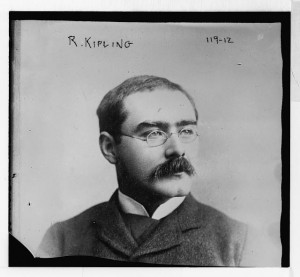
The Stranger within my gate,
He may be true or kind,
But he does not talk my talk–
I cannot feel his mind.
I see the face and the eyes and the mouth,
But not the soul behind.
The men of my own stock,
They may do ill or well,
But they tell the lies I am wanted to,
They are used to the lies I tell;
And we do not need interpreters
When we go to buy or sell.
The Stranger within my gates,
He may be evil or good,
But I cannot tell what powers control–
What reasons sway his mood;
Nor when the Gods of his far-off land
Shall repossess his blood.
The men of my own stock,
Bitter bad they may be,
But, at least, they hear the things I hear,
And see the things I see;
And whatever I think of them and their likes
They think of the likes of me.
This was my father’s belief
And this is also mine:
Let the corn be all one sheaf–
And the grapes be all one vine,
Ere our children’s teeth are set on edge
By bitter bread and wine.
– Rudyard Kipling
“The Stranger” speaks to the difficulty of living with foreigners in one’s own land. It is not the stranger that is rejected, but where he is — “within my gates”.
Where the men in Kipling’s time thought the differences between peoples were immutably tied to their blood, in our own time we take a more nuanced view. Culture is separate from genetics. The danger of becoming a stranger in one’s own country remains, even if our understanding of the underlying cause of this incompatibility changes.
The poem has been interpreted by Neo-Nazis as a testament to their beliefs. Kevin Morris, a more moderate critic, while acknowledging Kipling as a man of his time, also shows him to be a man who denounced Naziism and had great respect for foreign peoples. “The Stranger” does not condemn the foreigner as intrinsically bad, but that his differences from those around him make regular interaction uncomfortable. A society lacking commonality of language, social understanding and behavior is a miserable thing.
The heart of the poem remains true beyond the vicissitudes of history — A country must remain united as one people to prosper. We must be careful in who we allow within our gates. Where before we thought this tied to blood, we now acknowledge that it is culture that more truly makes the man — blood is only a useful metaphor.
Foreign influences have their place. Any farmer will tell you that the careful mixing of seed stocks lead to a better harvest. But this mixing must be carefully controlled, “ere our children’s teeth are set on edge, by bitter bread and wine. “







Look at the state of the world today, and think.
The biggest thing culturally is that Muslims will never assimilate when they are in the majority. They remain a foreign thing in any country. But the greatest harvest of dissent was sown by Luther some five hundred years ago. What was mostly a homogenous society throughout Europe became so conflicted that Europe was then torn by resulting wars for four hundred years and is still torn culturally. What was before called Christendom is now called “the European union” which is neither European nor united.
Michel,
Kipling was well-traveled and fully aware of the good will in the hearts of people from around the world. He also understood the world in which he lived, one where suspicion and stereotypes existed from all sides. This is not autobiographical. He is creating a fictional persona that represents all men and their xenophobia. “My father’s belief” shows that these feelings are cultural and generational.
The truth is, for all his modern trappings, man is still fundamentally tribal in nature. We are still prone to congregating with those much like ourselves. Despite our public embrace of “the melting pot” or “multiculturism,” privately we’re prone, perhaps even evolutionarily predisposed to hanging out with those most like ourselves. Trevor Phillips, head of Britain’s Equality and Human Rights Commission, noted even in his childhood that London’s neighborhoods were largely black, Indian, Irish, Jewish, etc. It’s predictable and natural that we do this. A century earlier Kipling knew this too.
Indeed, the stranger within my gates is a white socialist who holds the gate open for others to take my home while other white socialists hold me down so I cannot shut the gate. Those entering are not the enemy, the stranger. They are doing what normal people should do. The enemy, the stranger, are those members of my own stock who make war on their own.
Culture is separate from genetics! HA! Where do you think cultures originate? Culture emerges from biology.
Kipling was just being true to his own nature; he was just being genuinely British. Whether he approved or not of the attitude of the character in the poem, he identified with it, that much is obvious. The Brits -perhaps I should say the English- don’t like to be labelled a nation of xenophobic islanders, suspicious and disdainful of everything that comes from abroad. Most educated Britons would actually take offence at being described thus. But that is precisely what they are. In this, they are not fundamentally different from most other Europeans. The British have the saving grace (or supreme hypocrisy, do not know which) that they can be xenophobic and suspicious, while being very polite at it. I like the poem, and I like Kipling. In this respect however, he was quintessentially British, and there is no use pretending otherwise.
“shows him to be a man who denounced Naziism”
If I had to guess that is probably because he didn’t agree with their economic policy, not their social policy.
He penned a poem called “The White Man’s Burden” that literally calls non-whites, and I quote: “half devil and half child.” Hitler very well may have looked upon other races in a better light than Kipling, except maybe the Jews, but at the same time the actions of Jews were responsible for Hitler’s view of them so you can hardly blame him from learning from experience.